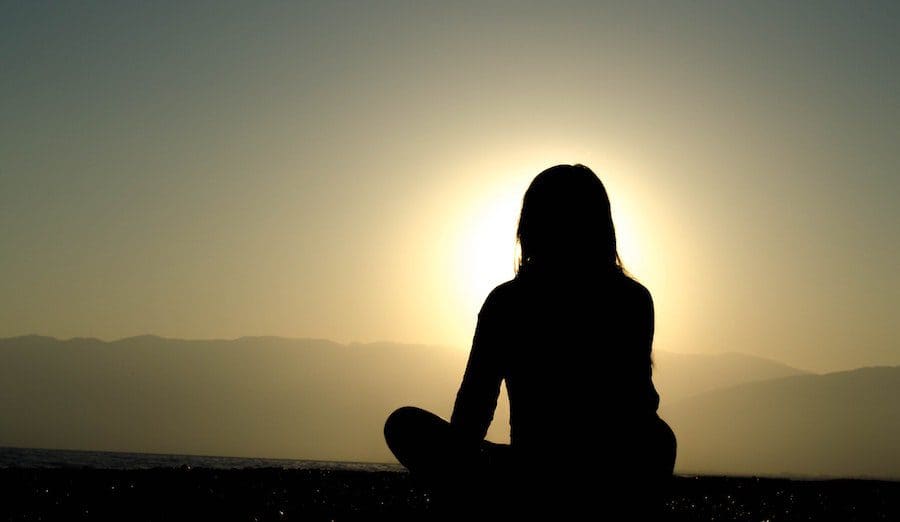Full Disclosure: Clicking on these links could mean a tiny commission for me, at no extra cost to you.
It’s totally human to get overwhelmed in your thoughts, worries, fears and anxiety, and become forgetful or absent from the present moment. It happens to the best of us and that’s nothing to be ashamed of. But what if I told you learning how to be mindful can help prevent these feelings of disconnect, angst and worry? Well, I don’t have to because science already has. Practising mindfulness has shown time and time again that brings a plethora of benefits to the table. From calming anxiety and reducing symptoms of mental illness to protecting your emotional wellbeing and improving physical health conditions, mindfulness can be the key to living better. But how do you start a mindfulness practice? What does that even mean? Let’s dive in.
Define Mindful: What Does It Really Mean?
Mindful refers to the quality or state of being conscious or aware of something. In a more specific context, it involves being fully present and engaged in the current moment, without being distracted or overwhelmed by thoughts, emotions, or external stimuli.
What is Mindfulness?
Mindfulness is a mental practice that encourages paying attention to one’s thoughts, feelings, bodily sensations, and surrounding environment with an open, accepting, and non-judgmental attitude. It can be traced back to ancient Buddhist traditions, where it was a fundamental aspect of meditation practices.
Today, mindfulness has been adapted into various therapeutic approaches and self-help strategies aimed at improving mental health.
The Connection Between Mindfulness and Mental Health
Practicing mindfulness has a strong impact on mental health. It helps manage anxiety by bringing awareness to the present moment and breaking the cycle of worry and rumination. Mindfulness also reduces stress by promoting relaxation and a sense of calm.
This is because anxiety often stems from overthinking and worrying about the future. Mindfulness encourages focusing on the present, thereby reducing the tendency to ruminate on potential future threats. This shift in focus can significantly decrease stress levels and improve mental clarity.
Mental Health Benefits of Being Mindful
Mindfulness has been scientifically proven to offer all kinds of powerful benefits for mental health, including reduced anxiety, enhanced emotional regulation, and improved overall well-being. This practice can help reduce stress, improve mental clarity, and enhance other aspects of your physical and emotional health as well.
Let’s go over some of the top benefits of being mindful, specifically for your mental health.
- Reduced Stress: Lowers stress levels by promoting relaxation and reducing the body’s stress response.
- Decreased Anxiety: Interrupts the cycle of worry and rumination that often contributes to anxiety.
- Improved Emotional Regulation: Enhances the ability to manage and respond to emotions in a healthy way, leading to better emotional stability.
- Enhanced Focus and Concentration: Improves attention span and the ability to concentrate on tasks.
- Better Mood & Less Depression: Increase positive emotions and reduce symptoms of depression, leading to an overall better mood.
- Increased Self-Awareness: Helps you become more aware of their thoughts, feelings, and behavior for greater self-understanding.
- Improved Resilience: Makes it easier to cope with challenges and bounce back from setbacks.
- Enhanced Relationships: Improves communication and empathy, leading to more positive and fulfilling relationships.
- Reduced Symptoms of PTSD: Helps manage post-traumatic stress disorder (PTSD) symptoms and reduce flashbacks and anxiety.
- Better Sleep: Improve sleep quality by promoting relaxation and reducing the mental chatter that can interfere with sleep.
- Lower Blood Pressure: Lowers blood pressure, which is beneficial for overall health.
- Enhanced Cognitive Flexibility: Improves cognitive flexibility, allowing for better problem-solving and adaptability.
- Reduction in Negative Thought Patterns: Helps break the habit of negative thinking by creating a more balanced and objective perspective.
- Decreased Substance Abuse: Mindfulness-based interventions can help reduce the risk of substance abuse by promoting healthier coping mechanisms.
- Improved Mind-Body Connection: Enhances awareness of the body’s signals and needs, promoting better physical health alongside mental health.
We could go on and on for days, but you get the point: being mindful is the way to go for a better mindset and mental health.
Daily Mindfulness Practices To Help You Be Mindful Every Day
Incorporating mindfulness into your daily routine can be simple and effective. Begin by setting aside a few minutes each day for mindfulness. Gradually increase this time as you become more comfortable with the practice. Start with basic exercises like mindful breathing and gradually incorporate more complex practices like mindful meditation and mindful walking.
Here are some practical mindfulness techniques and exercises to help you get started.
1. Mindful Breathing Techniques
Mindful breathing is one of the simplest yet most powerful mindfulness practices. It involves paying close attention to your breath and noticing its natural rhythm and flow.
Deep breathing exercises can help calm the mind and reduce anxiety. Try inhaling deeply through your nose, holding your breath for a few seconds, and then exhaling slowly through your mouth.
Another effective breathing technique is counting your breaths. Inhale and exhale, counting “one” for the first breath, “two” for the second, and so on up to ten. Then start over. This simple practice can help focus your mind and reduce anxious thoughts.
Breathe deeper, reduce stress, and boost your mental health with our expert-led sessions designed for all levels. For a limited time, enjoy one month free with our exclusive discount!
2. Mindful Meditation
Meditation is the foundation of a strong mindfulness practice. It involves sitting quietly, focusing on your breath, and gently bringing your mind back to the present whenever it starts to wander.
Guided meditations can be especially helpful for beginners embarking on their mindful journey, as the narrator leads you through the practice, step-by-step. There are many meditation apps and online resources available to guide you through different types of meditation.
In fact, apps like Headspace, The Tapping Solution, and The Mindfulness App all offer a variety of guided meditations specific for different needs, such as reducing anxiety, improving sleep, and enhancing focus.
3. Mindful Eating
Mindful eating involves paying full attention to the experience of eating and drinking, both inside and outside the body. It encourages savoring each bite and being aware of the textures, flavors, and aromas of your food.
Take time to enjoy your meals. Eat slowly, chew thoroughly, and savor each bite. This practice can enhance your enjoyment of food and help you develop a healthier relationship with eating.
Additionally, try to avoid eating while watching TV, working, or using your phone. Instead, focus solely on your meal. This can help you tune into your body’s hunger and fullness signals, promoting better digestion and a more satisfying eating experience.
4. Mindful Walking
Mindful walking is a form of moving meditation that involves walking slowly and deliberately, paying attention to the sensation of your feet touching the ground and the movement of your body.
Find a quiet place where you can walk slowly without distractions. Focus on the sensation of each step and the rhythm of your breath. This practice can be a refreshing way to incorporate mindfulness into your day.
In addition to helping you clear your mind, reduce stress, and improve your overall sense of well-being, mindful movement also serves as a gentle form of exercise that supports your physical health too.
5. Being Mindful During Everyday Tasks
You can practice mindfulness in almost any activity, from cleaning to cooking to driving. The key is to focus fully on the task at hand, noticing the details and staying present.
When cleaning, pay attention to the movements of your body, the textures and smells of the cleaning products, and the satisfaction of completing the task.
While cooking, focus on the process of preparing the ingredients, the sounds and smells of the kitchen, and the act of creating a meal.
Even driving can be an opportunity for mindfulness. Pay attention to the sensation of your hands on the wheel, the sound of the engine, and the sights around you.
6. Journaling for Mindfulness
Journaling can be a powerful tool for mindfulness, helping you reflect on your experiences and gain insight into your thoughts and feelings. Spend a few minutes each day writing about your thoughts, feelings, and experiences. This practice can help you process your emotions and gain a deeper understanding of yourself.
Gratitude journals are also great, as they allow you to reflect and be present in the things you’re grateful for. This practice can help shift your focus to the positive aspects of your life and enhance your overall sense of well-being.
8. Practice Active Listening
Active listening is a mindful practice that involves fully concentrating, understanding, responding, and remembering what is being said in a conversation. It goes beyond merely hearing words, as it requires attentiveness and engagement to truly understand the speaker’s message and emotions. This can be particularly helpful during moments of anxiety, especially social anxiety, as you can easily get caught up in the sensations you’re feeling, completely taking you away from the conversation you’re having.
As such, practicing active listening can greatly enhance communication, improve relationships, and create a deeper connection with others. It also serves as a powerful coping technique for anxiety.
9. Take It To The Yoga Mat
Yoga is a holistic practice that combines physical postures, breath control, meditation, and ethical principles to promote physical, mental, and spiritual well-being. As you can imagine, it is deeply rooted in mindfulness, encouraging you to pay attention to your breath and body as you move from pose to pose.
As an added bonus, it’s an excellent form of exercise that will boost your endorphins and give you additional benefits for your physical health.
Conclusion
There is no shortcut to mindfulness. It takes practice and patience, and compassion. Your mind will drift. You will still think too far ahead into the future or too far in the past. You are human. However, what makes the difference is having the ability to recognize these moments, so you can bring yourself back to the present moment.
Incorporating mindfulness into your daily routine can help you strengthen your ability to be mindful. By practicing mindfulness, you can reduce anxiety, improve emotional regulation, and enhance your overall well-being. Start with some simple techniques and gradually build a routine that works for you. Remember, the key to mindfulness is consistency and being present in the moment, so keep going!
Frequently Asked Questions
- How can I start practicing mindfulness?
Starting with simple techniques like mindful breathing and gradually incorporating more practices can help you establish a mindfulness routine or download the mindfulness app for activities and meditations right on your phone. - Can mindfulness help with anxiety?
Yes, mindfulness can be very effective in reducing anxiety by helping you stay present and breaking the cycle of worry. - What are some good mindfulness apps?
Popular mindfulness apps include Headspace and The Mindfulness App. - How often should I practice mindfulness?
Even a few minutes of mindfulness practice each day can be beneficial. The key is consistency. - Can children practice mindfulness?
Yes, children can practice mindfulness through fun and engaging activities like mindful breathing, coloring, and guided imagery. - Do I need any special equipment to practice mindfulness?
No special equipment is needed to practice mindfulness, but tools like meditation cushions, journals, and guided meditation recordings can be helpful.









